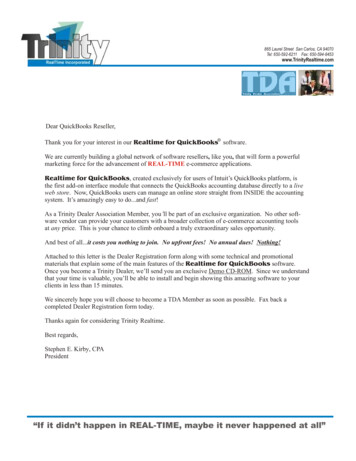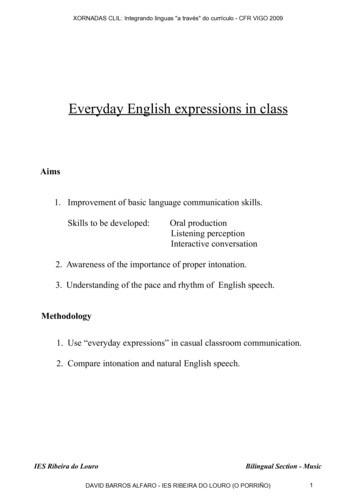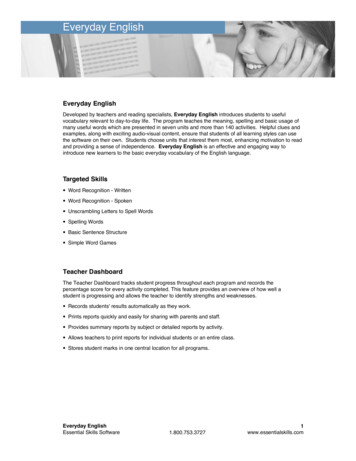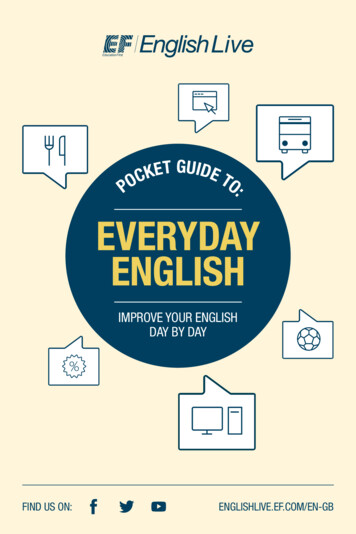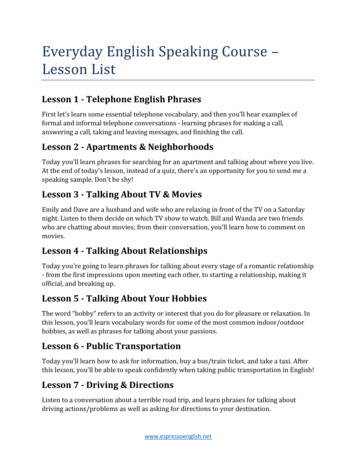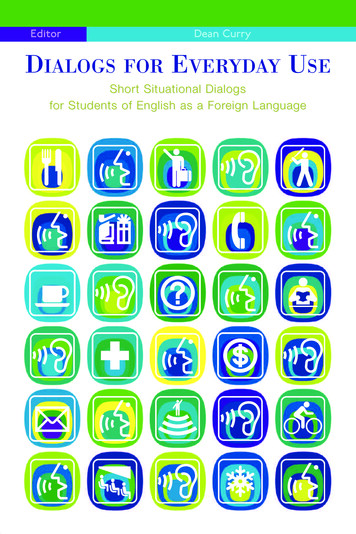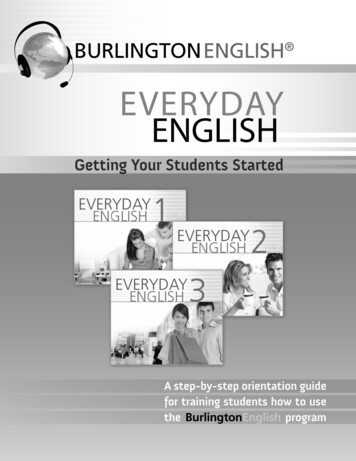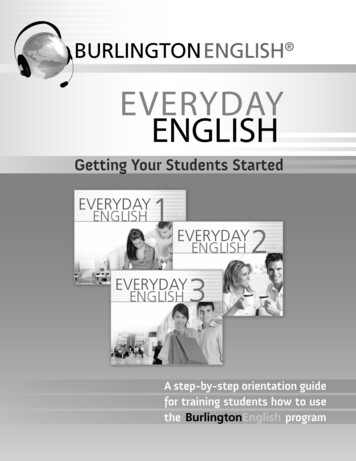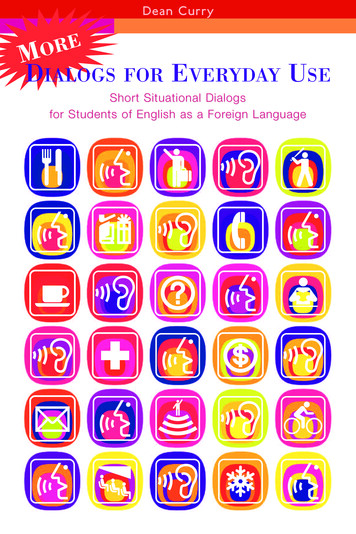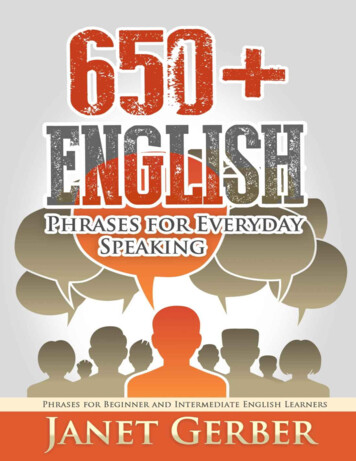
Transcription
650 English Phrases forEveryday SpeakingPhrases for Beginning and Intermediate English LearnersBy Janet Gerberhttp://EnglishTonightBooks.com
650 English Phrases for Everyday Speaking Copyright 2014 by Janet GerberAll rights reserved. No part of this book can be reproduced in any form without permission in writingfrom the author. Reviewers may quote a brief passage in their review.DisclaimerNo part of this book can be reproduced or transmitted in any form or by any means, electronic ormechanical, including photocopying and recording or by any information storage or retrieval systemor by email without written permission from publisher.While all attempts have been made to verify the information provided in this book, neither the authornor the publisher assumes any responsibility for errors, omissions, or different interpretations of thesubject matter herein.Neither the author nor the publisher assumes any responsibility or liability on behalf of the reader ofthis book.This book is for entertainment purposed only. The views expressed are those of the author alone andshould not be taken as expert instruction or commands. The reader is responsible for his or her ownactions in regards to the information in this book.Any perceived slight of any individual or organization is not intentional.
A Free Gift for You!As a way of saying ‘Thanks!’ for your purchase, I’m offering a free 5-Day e-course that is exclusive tomy book and blog readers.The free 5-Day e-course is on speaking and understanding English better. In this e-course you willlearn a variety of ways to help you improve your English speaking and comprehension.This 5-Day e-course is in video format and you can access the 5-Day e-course by going here.
650 English Phrases for Everyday SpeakingIntroduction to BookGreeting SomeoneSaying Good-ByeIntroductionsTalking about LikesTalking about DislikesWhat do you do?/Your jobWhat are you doing right now?Talking about the pastTalking about the futureRoutinesHobbies and Free TimeFamilyRelationshipsPersonal CharacteristicsFoodWeatherTransportationTelling TimeDirectionsCalendarNumbersWhere are you from?/NationalitiesTV and MoviesNeighborhoods and HousesGrocery ShoppingRestaurant or Coffee ShopClothes and ShoesBeing Sick, Doctors and HospitalsCrime, Safety and PoliceProblems/AdviceMaking Plans/ExcusesInvitationsTalking about Your feelingsAgreeing and DisagreeingSimilarities and DifferencesStating Your Opinion
ComplainingRequesting Information/Asking for SomethingAsking questionsInterjections
IntroductionAre you a beginning or intermediate English learner?Do you want to learn common phrases to help you improve your English speaking?Do you have trouble talking about common subjects in English?This book was designed for:-Beginner and Intermediate English learners.-English learners that would like to learn common phrases based around everyday topics-English learners that don’t know what to say and need help taking about common subjectLearning English is difficult. It is hard because there is so much to learn.When you are learning English focus on learning phrases that you can use over and over again. Don’tworry too much about verbs tenses and extensive vocabulary lists. The most important thing aboutlearning a new language is that you are able to communicate with other people. You don’t have to beperfect. You just have to try.In this book you will learn 650 common phrases to help you talk about forty (40) common every daysubjects. This book is centered on giving you the phrases and ideas you need to talk about each subjectin an everyday setting.Each section has common phrases and questions used to talk about a central topic. It also includesexample sentences to help you further your understanding.Most sections include links to additional resources on these topics. The additional recourses are veryhelpful because you will have the opportunity to hear and watch videos about these subjects online andlearn more vocabulary and phrase about topics that interest you.Remember when learning a language, it is important to improve your reading, writing, speaking andlistening skills; not just one at a time.This book is not for:-people who love grammar rules-people who are advanced learners or native speakers of the English language-people who have a very basic understanding or don’t understand any EnglishThis is not a text book. This book is a compilation of common phrases and resources about topics thatare common in every day speaking.
About the Author:My name is Janet Gerber. I am a teacher and language learner just like you. My goal is to help youimprove English using practical methods I will never encourage you to memorize verb tenses orword lists.I run the website English Tonight, where you can find English lessons and activities to help you learnEnglish online in your own time.Other books Janet Gerber has written:How to Speak English FluentlyReady to learn some new phrases? Great let’s get started.
Greeting SomeoneGreeting someone is what you do when you first see them basically saying ‘Hello’. There are manydifferent ways people greet each other in English. Some being formal or appropriate for everysituation and others being informal and something you should say only to close friends or family.In the United States, the most common way to greet someone with words. In formal situations or whenyou meet someone for the first time you shake hands. Some people wave at one another. In informalsituations with people you know (family or good friends) you may hug or kiss one another.Formal GreetingsHelloHello ! (Insert name of person)How are you?How are you doing?How have you been?Good Morning!Good Afternoon!Good Evening!Informal GreetingsHi!Hey!What’s up?How’s it going?What’s new?What have you been up to?How are ya?Additional ResourcesClick here to hear audio of some formal and informal greetings in English.
Saying Good-ByeHow you say good-bye in English depends on who you are talking to. There are formal, informal andVERY informal ways to say good-bye.Similar to greetings, some people shake hands, wave, hug and kiss but this varies from situation tosituation. It is best to follow what other people are doing or to do what makes you comfortable.FormalGood-ByeHave a nice day!It was nice seeing you again.I look forward to seeing you again.Take care.Good night!InformalByeBye-ByeSee you later! Or- See you soon!Talk to you later.Take it easy.I’ve got to get going.I’ve got to run.Really InformalCheck you later.I’m out. Or- I’m out of here.I’m off.I’ve gotta take off.See ya.PeaceAdditional ResourcesVideo on 10 basic ways to ‘Say Good-Bye’ in English.
IntroductionsWhen you meet someone for the first time you need to introduce yourself, which means telling themwho you are.When you are introducing yourself or someone else you can also share a little more information. Forexample your job title, how you know the host, or something else about yourself.Introducing YourselfHello, I’m .I am .Hey, I’m .Introducing Someone Else (Formal)This is . He/She is my co-worker.This is . He/She is .I’d like to introduce you to , the at .I would like you to meet .Introducing Someone Else (Informal)This is .This is my friend .Examples Introductions- Hi! I’m Elizabeth, Eric’s cousin.- Hey, I’m Betsy. I’m the new project manager.- This is Carl. He is our new IT manager.- This is my girlfriend Paula.- I’d like you to meet Anna. She has been a friend of mine for ten years.Additional Resources1- Video on introducing yourself.
Talking about LikesThere are different ways to say you like or enjoy something in English.I like I enjoy My favorite is If you really like something and want to emphasize how much you like it, you could use one of thephrases below.I love I really like/love I adore Example Sentences- I like pizza.- I like to read books by Dr. Seuss.- Peter enjoys running in the snow.- I enjoy this peace and quiet.- I love eating sushi. It is so delicious.- I love learning new things.- Bob really loves the new morning program on NBC.- I really like taking long walks in on the beach.- I adore Maria. She is such a nice girl.- My favorite movie is Top Gun. It is full of action.Additional Resources1- You can listen to a podcast on likes and dislikes here.
Talking about DislikesThere are many ways to talk about things you don’t likes. Below you will find some sentence startersand example sentences.I don’t like I don’t enjoy I dislike *I hate My least favorite is Example SentencesI don’t like fish.I don’t like to pick up after my kids.I don’t enjoy eating spicy food.I don’t enjoy talking to my boss.I dislike this song.*I hate bugs.I hate crying babies. They give me a headache.My least favorite food is spinach.My least favorite season is winter.* Dislike is not very commonly used in American English. You can use it and it is correct but not usedas often as ‘don’t like’ or ‘hate’.Additional ResourcesVideo: Talking about your likes and dislikes
What do you do? /JobsWhat do you do, is a common question. It is what you ask someone when you want to know what theywork in or how they spend their time. It is impolite and not common to directly ask someone, “Whatis your job?” in English.When someone asks you “What do you do?” they mean What do you work in?What do you do for a living?How do you spend most of your time?Possible Ways to AnswerI’m a I am I work as a Example SentencesI’m a teacher.I’m a full time student.I’m a stay at home mom.I work as an engineer.I am in between jobs right now.I am a retired nurse.I’m a college student and work part-time as a bartender.I work in a paper factory.I work in sales for a large telecommunications company.Addition Resources1- Different examples of how you can respond to ‘What do you do?’2- Video about asking and answering ‘What do you do?’ in English
What Are You Doing Right Now?In the United States, it is common to ask someone ‘What are doing?’. If someone asks you this, theywant to know what you are doing in this exact moment.I am verb ingExample SentencesI am reading a book.I am practicing English.I am talking on the phone.I am learning to speak English.I am writing a note.I am cooking dinnerI am cleaning the kitchen.I am washing clothes.I am driving to work.I am at work.I am making an appointment.I am paying bills online.I am chatting with my friends on Skype.If you aren’t don’t anything really interesting you could respond by saying:NothingNothing muchNot muchAdditional Resources:Song about ‘What are you doing? to help practice present continuous.
Talking about the PastIt is very common to talk about things that already happened. If something already happened or isfinished it is in the past. Below you will find some sentence starters and example sentences to helpyou talk about things you have done in the past.Most Common Verbs Used to Talk about the PastI went I ate I was I read I played I saw I talked to I worked Example Sentences:I went to work.I ate spaghetti for lunch.I read two books over the weekend.I saw a movie.I talked to my friend.List of Common ‘Times’ in the PastYesterday Two days ago Seven years ago An hour ago A little bit ago Last week Last month Last year When I was a kid When I was growing up
Talking about the FutureTalking about something that you will do or want to do in the future is very common. Below you willlearn some phrases to help you talk about the future or something that hasn’t happened yet.The two most common phrases used to talk about the future are:I will I am going to List of Common ‘Times’ in the FutureTomorrow Next week Next month Next year In a few weeks In a few years When I retire Example SentencesI will go on vacation in June.I will meet with my friends on Friday.I will go shopping next week.Tomorrow I am going swimming.Next year I am moving to Boston.I am going to get married in a few years.When I retire I am going to travel a lot.Additional Resources1- Video talking about ‘Will and Going to’2- 10 Expressions to use when talking about the future3- Another Video on ‘Will and be going to’4- What are you going to do this weekend? Video
RoutinesA routine is something you do every day or often. Below you will learn different phrases to help youexplain your routines.List of some things you do every day or often:Wake up, go to sleep, brush your teeth, take a shower, use the internet, cook, clean, drive, talk to yourhusband or wife, study, read, etc.I every day.On and , I .Every , I .I three times a week.Example SentencesI wake up at 7am.I work out four days a week.I play baseball every Sunday.I go to work every day.I go to school five days a week.I brush my teeth every day.I drink coffee every morning.On Tuesdays and Thursdays, I go to English class.I take a shower every night.I eat three times a day.I go to Italy every summer.Additional Resources1- Video about activities your do every day2- Vocabulary often used when talking about daily routines3- Song about routines in English
Hobbies & Free TimeA hobby is something that you do in your free time. It is something that you enjoy doing and do often.Free time is a time when you don’t have to work or don’t have any other obligations.In American English it is not common to use the word hobby. It is more common to ask say:What do you like to do for fun?What do you like to do in your free time?Common ways to respond to these questions are:In my free time, I I like in my free time.I every week.I am learning to When I’m not working, I like to Example SentencesIn my free time, I like to work out at the gym.I like to spend time with my family and friends in my free time.I am learning to play the guitar.When I’m not working, I like to run and play soccer.I li
learn more vocabulary and phrase about topics that interest you. Remember when learning a language, it is important to improve your reading, writing, speaking and listening skills; not just one at a time. This book is not for:-people who love grammar rules-people who are advanced learners or native speakers of the English language -people who have a very basic understanding or don’t .
